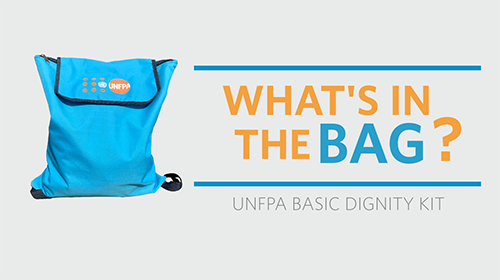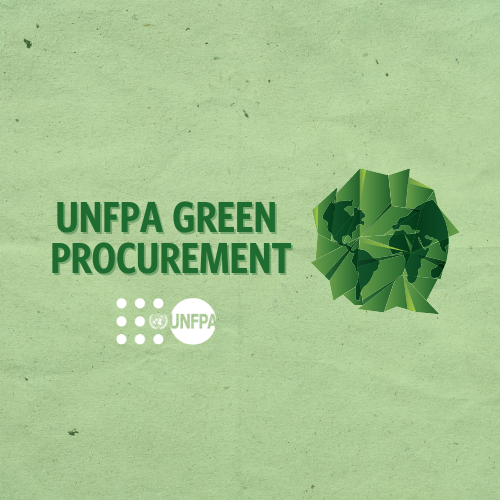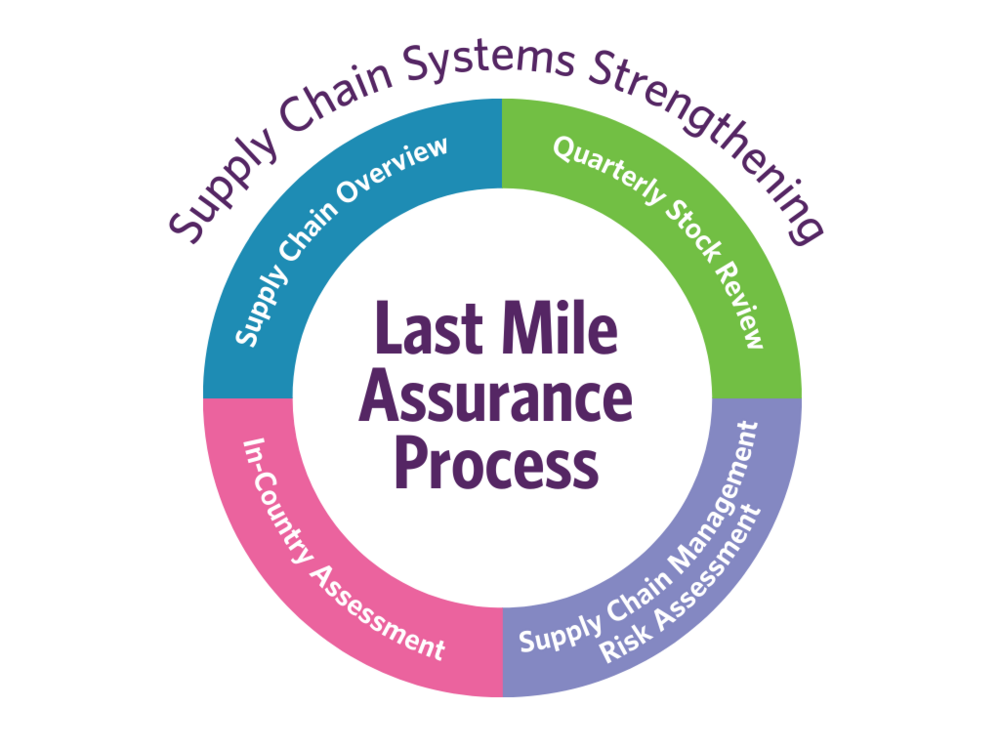The supply chain partner for sexual and reproductive health and rights
UNFPA is the lead agency within the United Nations system for the procurement of sexual and reproductive health (SRH) supplies and the world’s largest public-sector procurer of contraceptives. We leverage the significant volume of contraceptives procured annually to secure cost-effective, quality products to meet global needs.
The UNFPA Supply Chain Management Unit (SCMU) provides the organization with a responsive and resilient supply chain system across development and humanitarian settings. The SCMU delivers coordination and oversight of all UNFPA supply chain-related activities to reach women and adolescents and expand equitable access to affordable, quality-assured SRH products and services.
Access to safe, voluntary family planning is a human right. Few things have a greater impact on the life of a woman than the number and spacing of her children. Family planning is central to gender equality and women’s empowerment, and it is a key factor in reducing poverty. One measure of access to sexual and reproductive health services is the extent to which a woman who wants to use a method of contraception has access to it.
UNFPA delivers supplies to UNFPA programmes and partners in over 150 countries, managing a global supply chain that responds to the needs of partners in development. UNFPA partners with governments and non-governmental organizations (NGOs) to access UNFPA’s expertise and purchasing power to best make use of domestic resources and donor funds to procure supplies.
Humanitarian response procurement

UNFPA moves quickly when emergency strikes to protect the reproductive health of communities in crisis. In support of The Minimum Initial Service Package for Sexual & Reproductive Health, UNFPA keeps 13 different Inter-Agency Reproductive Health (IARH) Kits and a range of complementary commodities in stock for urgent and emergency requests. The IARH kits are designed for specific health service delivery levels and for specific population sizes for a period of 3 months.
UNFPA also maintains stock of basic Dignity Kits. The kits help women and girls maintain proper hygiene after being displaced and are a critical component of the UNFPA humanitarian response.
The basic kit contains 10 key essential supplies and can be delivered within 48 hours. Dignity Kits can also be customized with 39 different items.
Whether working in sexual and reproductive health, family planning, humanitarian response or census, UNFPA delivers quality supplies in a cost-effective and reliable way.
For more information, see the resources below or contact us.
Access to safe and effective contraceptives, medicines and equipment
UNFPA procures quality assured products including condoms, IUDs, medical devices & equipment, hormonal contraceptives, and medicines to support maternal, sexual and reproductive health.
UNFPA evaluates and prequalifies suppliers based on internationally recognized quality standards before entering into contractual agreements. UNFPA quality assurance activities follow a systematic process to ensure that products meet specified requirements and standards. Quality assurance activities include prequalification, technical evaluations, quality control, and monitoring. Quality control activities determine whether the specified standards are being maintained through inspection, sampling, and laboratory testing.
Please refer to the UNFPA Quality Assurance Framework for more detailed information.
Medicines
The UNFPA Quality Assurance system aligns with United Nations partner agencies. Following international quality standards and supported by the World Health Organization (WHO) and other organizations, UNFPA has defined a quality assurance policy for hormonal contraceptives and other medicines. The highest importance is given to the prequalification process. To prevent an interrupted supply of medicines under the WHO Prequalification Programme, an interim process called the Expert Review Panel (ERP) is available when fewer than three prequalified products are offered. The ERP is for manufacturers on their way to – but have yet to achieve – prequalification status. Results of the latest ERP process conducted are available here.
UNFPA evaluates and implements quality control measures for medicines not under WHO Prequalification or ERP assessment in accordance with good practices. This quality evaluation will be based on Good Manufacturing Practice (GMP) compliance and applicable technical documentation reviewed and approved by an internal technical committee.
Medical Devices
Medical devices and equipment are vital in the screening, prevention, treatment and management of illnesses, diseases and health interventions. UNFPA follows recommendations on standards and quality systems for medical devices set by the WHO and the International Medical Device Regulators Forum (IMDRF) to prevent the supply and use of substandard and falsified devices and equipment and safeguard public health and safety.
Capacity building
UNFPA offers capacity strengthening in the form of technical support, training, and mentoring activities for key stakeholders in the production and regulation of sexual and reproductive health commodities.
Joint WHO-UNICEF-UNFPA Meeting for Manufacturers and Suppliers
The registration is open to the UNICEF, UNFPA and WHO meeting for manufacturers and suppliers in UN City Copenhagen on 2-6 December 2024.
This year’s theme is: Ensuring Health Equity: Partnerships For Accessible Quality Products.
Environmental Strategy
The goal of the United Nations is to become climate neutral and environmentally sustainable, as described on the Greening the Blue initiative’s website.

The UNFPA Green Procurement Strategy outlines the environmental focus areas for which UNFPA has instituted requirements toward sustainability and the process through which suppliers are expected to demonstrate they meet these requirements. To make improvements, suppliers can exercise influence in four parts of their organization: at site level, supply chain, products and packaging.
Safe disposal of reproductive health commodities is critical as consequences of improper and unsafe disposal pose public health and environmental implications. UNFPA has developed a guidance document on responsible management and safe disposal of unusable by-products of UNFPA procured commodities.The Safe Disposal and Management of Unused, Unwanted Contraceptives provides recommendations on policies and procedures. The guideline should be useful for situations where commodities are expired, counterfeit, have quality issues or are unused for various reasons.
Social responsibility
UNFPA supports and encourages suppliers to participate in the UN Global Compact, a voluntary initiative covering human rights, labor rights and the environment. Suppliers must comply with the UNFPA General Conditions of Contract, which contain specific provisions regarding child labor, mines and sexual exploitation.
Last Mile Assurance: Strengthening Global Supply Chains
UNFPA delivers life-saving sexual and reproductive health commodities to countries worldwide. For UNFPA to achieve its transformative results of reducing unmet need for family planning, reducing preventable maternal deaths, and reducing gender-based violence and harmful practices, it is vital that quality-assured supplies reach communities on time.
To this effect, UNFPA’s Last Mile Assurance (LMA) process is a global initiative that supports the organization and its partners in implementing evidence-based interventions to improve supply chain performance and ensure that sexual and reproductive health supplies and services reach clients at the last mile.
The LMA process generates visibility on how UNFPA programme supplies are managed at different levels of the supply chain, allowing for better programming, targeted supply chain systems strengthening interventions, increased UNFPA and partner accountability, and enhanced capacity to fulfill UNFPA’s financial responsibilities to donors.
Through the annual LMA cycle, countries:
- Obtain an overview of their supply chains and a measure of their supply chain complexity and supply chain management (SCM) capacity
- Conduct a comprehensive review of stock levels of key sexual and reproductive health (SRH) commodities
- Measure supply chain management risk
- Assess traceability of UNFPA-donated commodities, stock risks, inventory management, and storage conditions in facilities at all supply chain levels
- Develop supply chain systems strengthening action plans
How is this done?
SCMU, UNFPA Regional Offices, UNFPA Country Offices, and partners collaborate to generate data that provides evidence for a holistic analysis of country supply chains.
Supply Chain (SC) Overview
The SC Overview is a questionnaire designed to gather initial visibility on the key components of the main supply chains through which UNFPA programme supplies flow. The collected data is used to assess supply chain complexity and SCM capacity, and to diagnose strengths and areas for improvement in quantification, logistics, supply chain structure, inventory management, human resources, storage infrastructure, distribution processes, stock availability, and supply chain management information systems.

Quarterly Stock Review (QSR)
To complete the QSR, partners identify the stock status of essential SRH commodities in central warehouses. This information enables stock monitoring and assists in the implementation of national procurement plans, including identification of commodity gaps. Furthermore, the QSR highlights stock risks such as product expiration and stockouts, allowing UNFPA and partners to take urgent action to correct stock imbalances and avoid loss.
Supply Chain Management (SCM) Risk Assessment
The SCM Risk Assessment measures the risk of UNFPA programme supplies not being adequately safeguarded and managed in-country, and not reaching intended clients and communities at the last mile. The risk assessment model encompasses 8 risk factors across 3 key areas: external risk, delivery risk, and fiduciary risk, as reflected in the UNFPA Risk Appetite Statement. Yearly risk ratings are generated for eligible partners, and these are used to develop mitigation strategies and identify strengthening needs. SCM risk ratings also determine the scope and frequency of subsequent LMA process activities.
In-Country Assessment (ICA)
In-country assessments are onsite visits to selected regions and facilities within a country. The assessment visits cover 12-15 facilities at all levels of the supply chain and a sample of 5-8 products.
The assessment is structured in 4 main areas: traceability of UNFPA-donated supplies, stock review, facility record-keeping practices and facility conditions. Each ICA verification area has corresponding key performance indicators (KPI). These indicators point to how commodities are managed in-country and determine the strengths and potential gaps of the supply chain. In each assessment, facility personnel are mentored on WHO good storage and distribution practices and, where feasible, corrective actions are taken on-site.
Supply Chain Systems Strengthening
The LMA process serves as a trigger for supply chain systems strengthening (SCSS). The SCSS framework is founded on WHO‘s 6 building blocks for Health Systems Strengthening (HSS). UNFPA and key stakeholders in the country incorporate results and recommendations from the LMA process into a strengthening action plan informed by the SCSS framework: leadership and governance, supply chain financing, information systems, human resources for supply chain management, service delivery, and health products and technologies. To ensure effectiveness, identified gaps are analyzed to understand their root causes, enabling the implementation of specific, measurable, and time-bound activities, with responsible organizations and individuals assigned to each. This SCSS approach facilitates strategic allocation of funding for strengthening activities and identification of areas of potential collaboration with other key partners in countries.
LMA’s Reach
In 2023, 75 countries conducted LMA activities, with the aim of strengthening health supply chain systems and expanding access to affordable, quality assured SRH products and services for women and adolescents around the world.
UNFPA catalogue
UNFPA is currently enhancing our Supply Chain online resources for optimal performance. We understand the importance of seamless service and apologize for any delays during this transition. Our team is diligently working to ensure a swift resolution. Should you have questions or need assistance to our product catalogue, please reach out to UNFPA Supply Chain Management Unit at supplychain@unfpa.org.




